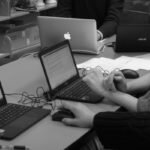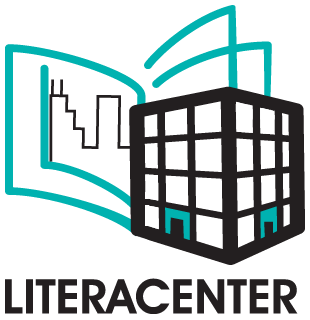In a stark white room, within an interactive art installation called The Nature of the Beast by Goshka Macuga, this month Connect Chicago pondered the challenge and promise of blending art with technology.
The exhibition space at Chicago’s Museum of Contemporary Art “was designed with a real emphasis on accommodating and encouraging meetings for discussion groups.” Gazing over the meeting table was an evocative tapestry of Prince William and an insouciant crowd gathered in front of a replica of Picasso’s Guernica. Our circular table at the center of the installation also served as an archive of materials recounting stories of war, art and protest. 
In that atmosphere, the Connect Chicago Meetup group gathered to discuss the inclusion of art in public computer centers and community technology centers in Chicago. The group was eclectic: attendees work at a wide range of computer centers, city agencies, nonprofits, art spaces and corporations. While an initial glance suggested little in common among those around the table, a fascinating conversation emerged and new connections were made.
Cíbola, an incubation hub for start-ups innovation, collaboration and creativity in Pilsen, seamlessly blends art, technology and social entrepreneurship. With “the vibe of a funky nightclub [and] the technology of a wired office,” Cíbola is modeled after the Harvard Innovation Lab. In addition to low cost office space for start-ups, Cíbola provides open studio space for art and building as well as funding for small art projects.
It was clear to the group that youth engagement and enrichment is key to addressing the digital skills gap in Chicago. We wondered: how do we convert teens’ natural adeptness with Facebook and social media to proficiency in other marketable technology skills, such as filling out job applications and software use? One answer came from Yolande Wilburn of Chicago Public Libraries. CPL’s YOUMedia spaces are innovative teen learning centers housed at six libraries across Chicago. High school students can access books, computers and a wide variety of software to improve their digital skills while creating. For musically inclined youth, the YOUMedia space at Harold Washington Library has cameras, keyboards, a mixing table and a recording studio.
In the vein of career development, Chris McAvoy at the Mozilla Foundation described his work on Open Badges. With this initiative, Mozilla is creating a system of digital badges that represent concrete, marketable skills obtained through online courses, after-school programs, as well as work and life experiences. Badge earners collect and store their badges on Mozilla’s system to get recognition and promote themselves, allowing potential employers or schools to see a more complete story of their skills. With coordination of city agencies and employers, Open Badges could become an important part of the employment process.
The ideas for integrating art into technology services were wide-ranging and innovative, but one theme was clear: the necessity and desire for cohesion and a grand convening of ideas. The city is bursting with brilliant people with creative solutions for bridging the digital divide. At Connect Chicago, we think that all those people should sit at one big table and together come up how best to use technology to make lives better in Chicago. As one Connect Chicago member put it, “We need to be in the business of sharing—sharing data, sharing knowledge.”
Join us for the next Meetup of Connect Chicago.






